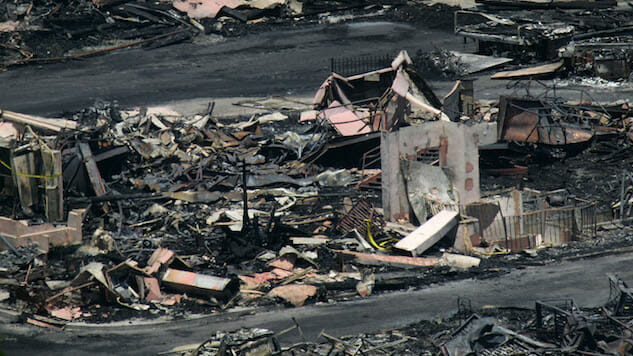Master Recordings by Elton John, Louis Armstrong, Countless Others Destroyed in 2008 Blaze
Photo by David McNew/Getty Music News Universal Music Group
This month marks the 11th anniversary of the day the music burned.
A New York Times investigation published Tuesday has revealed that Universal Music Group’s treasure trove of music treasures burned to the ground in 2008 after a fire that tore through part of Universal Studios Hollywood.
At the time, Universal downplayed the fire, likely trying to reduce public embarrassment and avoid angering artists or fans. The company claimed the fire had only destroyed the theme park’s “King Kong” attraction and a video vault with copies of old works. But that was not the case.
The blaze also ripped through an archive full of treasured recordings. Titled “The Day the Music Burned,” the story describes the fire as as “the biggest disaster in the history of the music business.”
So what happened and how did it go so incredibly wrong?
The fire that swept the Universal Studios backlot began early in the morning on June 1, 2008. A security guard saw flames rising from a rooftop on the New England Street set, among a stretch of Colonial-style small-town buildings.
The blaze began the morning after maintenance workers had used blowtorches to repair a roof. And while they followed protocol and waited for the shingles to cool as they worked, the fire broke out soon after they left.
The fire eventually snaked toward Building 6197, the video vault that housed tapes, reels and an impressive library of master sound recordings.
Hundreds of firefighters fought off the inferno, dousing it with foam retardant and water from a nearby lake. They also tore apart the warehouse to put out the fire more easily.
After the flames died down, what was left was ruins. Almost every single master recording in the vault was destroyed, some of which were from the biggest musicians since the 1940s.
Casualties included songs by Billie Holiday, Louis Armstrong, Duke Ellington, Al Jolson, Bing Crosby, Ella Fitzgerald and Judy Garland. Masters of some of Aretha Franklin’s first recordings were lost, along with almost all of Buddy Holly’s and John Coltrane’s masters, and countless hit singles such as Etta James’s “At Last,” The Kinsmen’s “Louie Louie,” and Bill Haley and His Comets’ “Rock Around the Clock.”
The fire claimed the recordings of artists spanning decades of music. Work by Ray Charles, B.B. King, Joan Baez, Neil Diamond, Joni Mitchell, Cat Stevens, Gladys Knight and The Pips, Elton John, Jimmy Buffett, Aerosmith, Patti LaBelle, R.E.M., Janet Jackson, Guns N’ Roses, Mary J. Blige, No Doubt, Nine Inch Nails, Snoop Dogg, Nirvana, Beck, Sheryl Crow, Tupac, Eminem and countless others were lost.
A confidential report by Universal in 2009 estimated the loss at 500,000 songs.
The loss was historic. And even Universal Music Group privately admitted the undeniable damage.
“Lost in the fire was, undoubtedly, a huge musical heritage,” one internal assessment explained, per the Times.
But Universal was able to turn headlines and prying eyes away from the fiery demise of their musical treasures and toward what they called a “triumph of crisis management.” Embarrassed and anxious about backlash, Universal shifted the narrative and re-characterized the tragedy as a crisis averted.
The real loss was found in internal documents acquired by the Times.
But to truly understand the extent of the loss, you need to understand the importance of master recordings.
A master is the one-of-a-kind original recording of a piece of music and the source used to create any other recording. It’s the recording in its truest form, the perfect sonic capture of the music and a moment in time. Any recording forged after it is just a step away sonically.
The vault stored masters dating back decades and recordings that had never been commercially released, now lost forever. And as three record company giants—Sony, Warner Music and Universal—hold the vast majority of the greatest recordings through history in their hands, the lost recordings were from one of the biggest and most important labels of all time.
You can read the Times piece in full here.